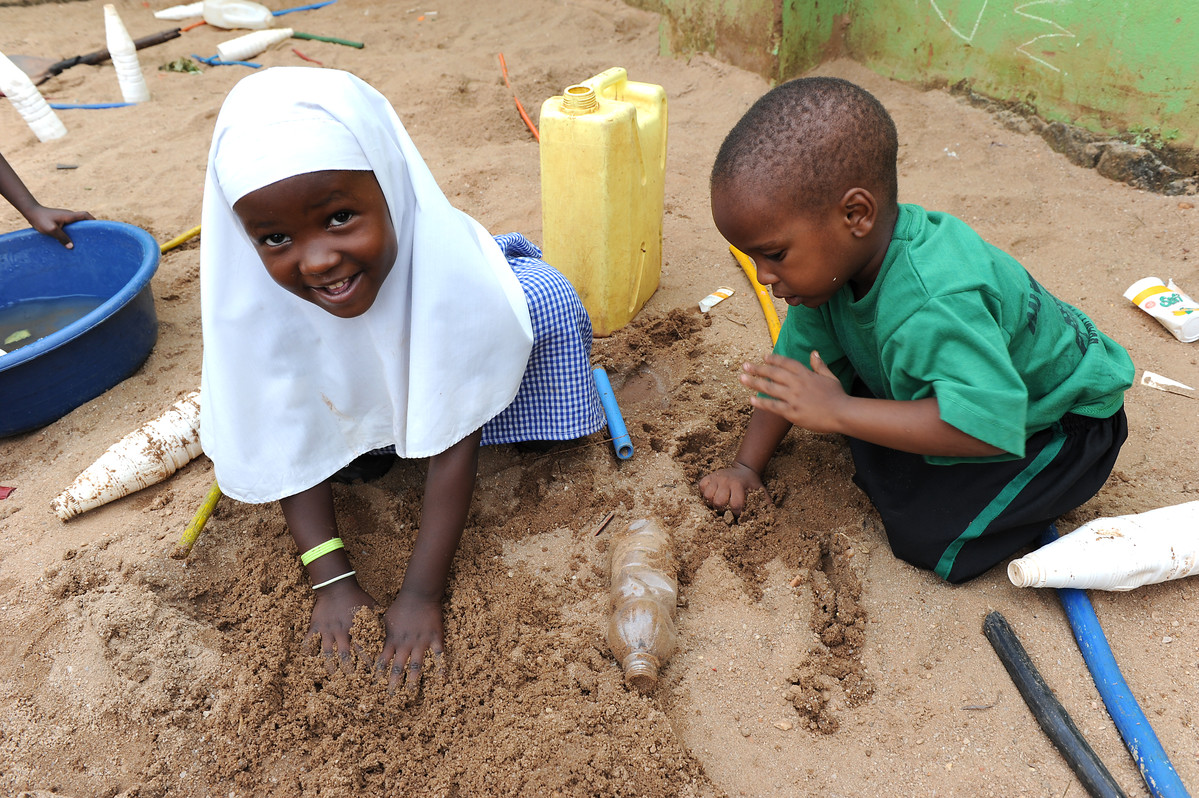When staff at Arua Islamic Nursery School in Uganda first embarked on their Human-Centred Design (HCD) journey with Schools2030, they were unsure where to concentrate their initial efforts.
As a design process that puts users first, HCD’s guiding principles required that the community was involved from the start to help co-identify their own issues and reclaim their ability to affect change. And so, the team at Arua Islamic Nursery set about consulting local people to find out what challenges their children might face when it comes to education.
Housed within Arua Islamic Primary School – one of twelve schools in Arua selected to be part of the Schools2030 cohort of 2020 – the staff at the community-based Early Childhood Development centre knew that with schools closed due to the pandemic, parents were struggling to keep their children safely and productively occupied. The team decided to focus on children from the lowest income families, who would likely need the most support to navigate this tricky period.

They decided to visit Waliya cell, a community in the centre of Arua town, where they met and consulted with a number of parents including Mr. Adam Anyole, father to six-year-old Murshid. Both Adam and his wife work away from home and would have to leave Murshid in the care of his grandmother, who was unable to keep up with his youthful energy. As a result, Murshid would spend most of his time roaming the streets with bigger boys exposing him to many risks – getting lost, for example, or even possible exposure to drugs or crime. Other parents shared that they too faced similar challenges, wanting to keep their children safe and engaged at home but being unable to give their own time to do so due to the need to work.
The series of consultations led the team to define the problem and reframe it as a question, asking: ‘How might we find a safe and engaging alternative to occupy children whilst they are out of school?’ After brainstorming, they developed the idea of a community play centre. Mr. Yamandu, the nursery leader, and his team discovered that a lack of play materials within communities was a key reason why young children were prone to wandering the streets. They reasoned that the play centre, if established, would keep the children in a secure place, where they could play and learn with others in a stimulating and conducive environment, and importantly stay on the path to future education.
“Even if it’s not the official day, you find them gathering at the centre to play”
Mboni Bruhani, Arua Cell community member
Together, the parents raised a contribution of 150,000 Ugandan Shillings, towards play and learning materials, and a community elder, Mr. Mustafa Khemis, offered a free space in his compound to host the play centre. The centre now opens twice a week and is free to all children between the ages of 3 to 8 years. It currently receives more than 25 children a day.
Parents who are able come to supervise the children, while teachers from the community volunteer to teach the children basic literacy and numeracy, using ‘learning through play’ methodologies. The community also contributes free items like old tins, boxes, banana fibre and sisal bags to be used for games and play materials like cars, ropes, straw hats and dolls. The centre has also attracted other services within the community, for example village health workers who offer the children free medical assistance.
Older children have now started coming to the centre too and even parents are getting more involved, with one of them offering space in their home to store all the play materials for free….The play centre is an example of what can be done when local actors come together to solve their own challenges.
A welcome addition to the community, the positive impact of the centre is already being felt. A community leader from Waliya cell, Mr. Mboni Bruhani, observed: “…young children are no longer roaming around the community aimlessly – even if it’s not the official day, you find them gathering at the centre to play.” He noted that the children themselves were becoming ambassadors of the centre, passing on information to their friends in other communities. They have also been seen engaging with their environment, collecting raw materials from the surroundings that they use to make additional play items.

Older children have now started coming to the centre too and even parents are getting more involved, with one of them offering space in their home to store all the play materials for free. The team is optimistic that children will continue coming to the centre to play and learn in a safe environment while building important life skills such as creativity, problem-solving and cooperation.
The play centre is an example of what can be done when local actors come together to solve their own challenges. With support from the Schools2030 programme, school communities like that of Arua Islamic Primary are being given the tools to identify their own needs and work towards solutions that will be tracked over time against learning outcomes. In this way, that these locally driven models for change can serve other contexts, with education stakeholders able to pass on learnings to the global community, with the potential to catalyse system-level change. With communities playing a major role in solving their own challenges, there is far greater likelihood that the solutions they generate will be feasible, actionable and may even last well beyond the life of the programme.
Ultimately though, all this work is really aimed at the children themselves – keeping them safe, nurtured and on the road to education success. With that in mind, it is important to remember that what might seem like a small victory to some, can be truly life-changing to others.
